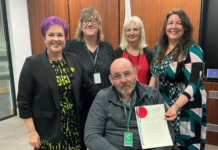The Government needs to urgently publish its consultation on its plans for a scheme to replace EU funding after Brexit with ongoing uncertainty preventing local areas from securing vital investment into their local economies, councils say today.
The Local Government Association, which represents councils across England and Wales, says that councils are ambitious for their communities and are committed to promoting local growth, creating jobs, supporting businesses and boosting the national economy.
EU funding has been a life-line for local economies. In July 2018, the Government committed to consulting on plans on what its successor, the UK Shared Prosperity Fund (UKSPF), will look like, but has yet to do so.
The LGA said the UKSPF provides the opportunity to give communities the long-term funding certainty they desperately need and join up both EU and UK pots of funding more effectively at a local level. This means granting elected mayors and local leaders who have a democratic mandate to represent their communities the opportunity to co-design UKSPF, ensuring any future growth funding is more accessible, based on local need and distributed over the longer-term.
Without EU replacement funding and wider growth funding certainty post-Brexit local areas are not able to plan for longer term investment in infrastructure and growth in their local economies, which could see communities missing out on millions of pounds of additional private investment to support infrastructure projects.
Local areas have already shown that the £5.3 billion they have received in EU funding since 2014 has been put to good use – providing targeted training and job support for residents and businesses, especially for vulnerable groups who experience additional barriers to accessing the workplace.
Examples include:
- Working with school, colleges and employers in its local area, Bradford Council is running its Get Bradford Working project which has helped more than 3,500 people into employment. Bradford has a high adult employment rate, with 66 per cent of the population in work compared with 75.4 per cent nationally. The project creates jobs by providing apprenticeship places, a step-change in curriculum for 14 to 19 years old, legitimising sole traders working in the shadow economy, and providing a range of support measures for employers and those furthest from the labour market. Bradford also runs its SkillsHouse, a one-stop-shop solution for recruitment, which has also supported more than 1,200 people into employment. It largely works with people who have been unemployed for more than a year, are recovering from a period of ill health, or require support with their literary and numeracy. As a result of its success, SkillHouse has expanded its offer in partnership with Leeds City Council.
- Nottingham City Council has secured ESF funding with Futures, a social enterprise careers and training company, it owns. Together they deliver the Nottingham Jobs service, an integrated model of employment, skills and careers advice which has supported 2,361 people into jobs. Of those, 599 were young people aged between 18 and 24, 329 had a disability, 448 were BAME, and another 301 were over 50. Futures also delivers the ESF Youth Employment Initiative on behalf of the City Council with services to support young people embedded in every school in Nottingham. Through this programme Futures supports young people with intensive careers support, ‘pre-traineeships’, travel support, and personal budgeting.
- Devon receives more than £150 million a year under the current EU aid funding. The majority comes via the Common Agriculture Policy (CAP) but there is also a significant amount in EU funding to improve business competitiveness, growth and broadband. Since 2014, with support from EU funding, Devon has been able to provide superfast broadband access to over 183,000 business and homes, released land for over 29,000 new homes and built business accommodation for up to 28,000 new jobs, created more than 5,000 new training, apprenticeship and job opportunities, and supported 2,000 small businesses.
- With one of the largest cohorts of young people in the country, Essex County Council, has brought together primary, secondary, further and higher education providers to identify the skills needs and challenges across Essex. As the rate of economic growth lags behind the national average across the county, the council has also developed a comprehensive programme of activities including an extensive network of 150 businesses to advise and inform skills planning and delivery across the county, working with local training providers to deliver new qualifications, and informing young people of local careers opportunity – especially in in-demand sectors such as care and HGV driver programmes. Research by the council also found that had EU funding been a single pot, they would have received up to £50 million more in funding. This could have supported an extra 117 businesses to improve competitiveness, 60 business start-ups, 155 jobs and 560 people acquire skills for work or improve life chances. With a freer hand to target resources to local needs, an additional 2,100 jobs could have been created and 700 in-work progressions secured through apprenticeships, increasing the economic impact to Essex by £20 million by 2021.”
The LGA also says Whitehall must not replace Brussels after Brexit. Powers need to be devolved beyond government and rest with local communities.
As part of this wider devolution agenda, the LGA is calling on the Government to put forward a new English Devolution Bill in the Queen’s Speech that would hand widespread powers and funding to local areas across the whole country.
Cllr Kevin Bentley, Chairman of the LGA’s Brexit Taskforce, said:
“Councils desperately need long-term certainty around how the UK will replace vital EU regional aid funding. A fully-funded, locally-driven UKSPF is central to improving people’s lives, supporting local businesses and boosting the national economy.
“Without further clarity, growth and investment in local areas is at risk.
“Councils want to work with the Government to ensure the UKSPF is developed quickly and to ensure that no area is left without investment into their communities and all parts of the country can benefit from the growth they so desperately need.”
Help keep news FREE for our readers
Supporting your local community newspaper/online news outlet is crucial now more than ever. If you believe in independent journalism, then consider making a valuable contribution by making a one-time or monthly donation. We operate in rural areas where providing unbiased news can be challenging. Read More About Supporting The West Wales Chronicle

























